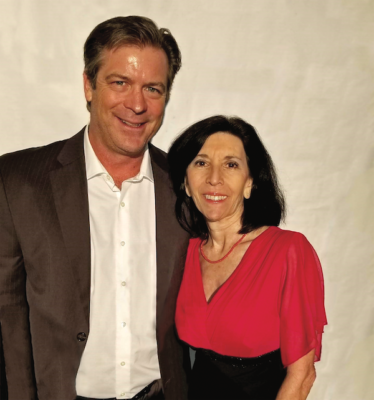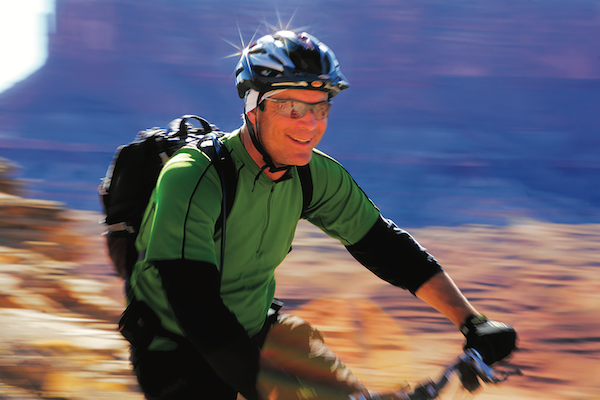A Couple Confronts CLL
This Outdoorsy Arizona Couple Shares Their Story of Facing Cancer Together
by Ashley Hubbard
An avid mountain biker, hiker, and swimmer, Cliff was as healthy as ever when he was diagnosed with chronic lymphocytic leukemia (CLL) in late 2020.
“Overnight, my whole life was changed. One day I was mountain biking, and the next day I had cancer,” Cliff shares. “I just went for a routine blood test with a new doctor because I hadn’t had a blood test in a few years, and it came back with a high white blood cell count and lymphocyte count.”

The Diagnosis
When he received his blood test results, the first person Cliff called was a family member, a hematologist at a large hospital. Right away, they deduced he had CLL and jokingly told Cliff that if he was going to get cancer, this was the best one to have.
Although this conversation helped comfort Cliff and his wife, Jane, they were still worried – naturally. For Jane, the word cancer hit her like a punch in the gut. And for good reason.
“I myself am an over 20-year survivor of breast cancer,” Jane shares. “So, when we got the notification that Cliff had cancer, I was thinking, Oh no, here we go again.”
As for Cliff, his concern turned toward his quality of life.
“I realized that cancer used to be viewed as a death sentence, but now it’s not so much anymore,” Cliff shares. “So, I wasn’t really so fearful about that. I was more afraid of not being able to mountain bike anymore. And of having to slow down all my activities.”
One day I was mountain biking, and the next day I had cancer.
Coping with CLL
Though the couple had previous cancer experience, they soon discovered that the cancer landscape had changed drastically in the 20 years since Jane’s cancer diagnosis. There were a lot more resources for people diagnosed with cancer and their loved ones.
Cliff found online forums where CLL survivors were sharing their experiences to be especially helpful and encouraging. He also made good use of a “CLL diary” to keep track of his symptoms. This helped him record and remember any concerns or questions he had for his doctor.
Jane’s Advice for Cancer Caregivers
☛ Be a good listener. Listen to how they may be feeling, not only with your ears, but also with your eyes. Notice nonverbal communication, like deep heavy sighs. If you can observe the signs that tell you your loved one is angry or annoyed, you can know when to back off and give them space.
☛ Breathe. I take lots of deep breaths, because when I do, it relaxes my muscles. Then I don’t feel so tense.
☛ Don’t compare situations. Look at your own situation and figure out what building blocks you have to get through this experience. Hearing others’ experiences can be helpful, but unless their circumstances are similar to yours, you may not be able to implement the exact same tips.
☛ Be involved. Go with your partner to their appointments and record them or take notes.
☛ Know that caregivers don’t have to be family members. Don’t be afraid to ask for help, whether it’s from a family member, a close friend, or somebody at your church. People want to help each other.
Cliff’s CLL Treatment
Generally speaking, CLL is a chronic, slow-growing cancer. Some people with CLL can go years before the disease progresses enough to warrant treatment. However, in Cliff’s case, he had to start treatment just two months after his diagnosis, as his white blood cell count was quickly rising and his bone and muscle pain was growing worse.
When Cliff started oral medication in January 2021, he was told that things were likely going to get worse before they got better.
“That was indeed the case,” he exclaims. “My muscular and skeletal pain got even worse. In April, I changed medications to hopefully reduce some of those side effects, and that worked.”
Since starting CALQUENCE® (acalabrutinib), Cliff says his side effects have dissipated for the most part. “I still have a little pain in my hands and feet and some mouth sores,” he says. “But the pain in my shoulders and my legs has started to get better and better. Now, I feel almost normal.”
This article was published in Coping® with Cancer magazine, March/April 2022.


